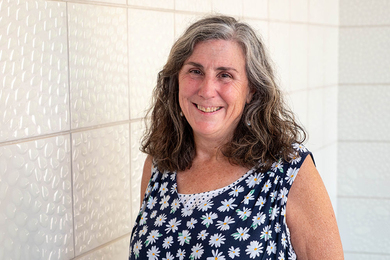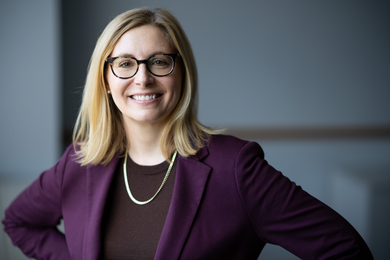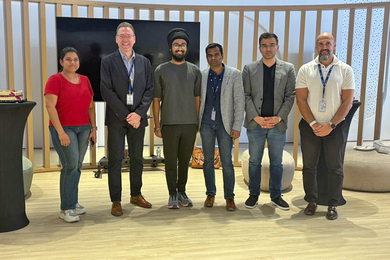This article was originally published in the winter 2001 issue of Spectrum.
You never know when great communication will come in handy, says MIT Debate Team President Raj Krishnan. Three months ago when his cousin got married, he was asked 15 minutes before dinner to make a toast.
"I had to give a speech in front of 200 people with no advance warning, but I think I pulled it off. That's the kind of real-world impact that impromptu speaking has taught me," he said.
Public speaking is a great skill to have in life, say members of MIT's Debate Team. Parliamentary debate, with its emphasis on impromptu speaking, develops excellent communication skills and teaches you to think on your feet.
Students say they love it because they learn to analyze issues and come up with solutions. They learn organization and clarity, how to persuade and how to listen. Debate also teaches the tricks of the trade -- eye contact and effective gestures -- and teaches students poise, presence and confidence.
Amit Roy, a senior in electrical engineering and computer science, interned last summer on Wall Street. "Having been on the debate team definitely came in handy during my job interview at Goldman Sachs. It helped me to think fast and come up with answers on the spur of the moment," said Mr. Roy, who already has been offered a full-time job at Goldman when he graduates this June.
After a long break in the '80s, the debate team was revived in 1991. The group now has 85 members -- and 55 have joined within the past year. "Membership has nearly tripled," Mr. Roy said. "People are realizing that debate builds beneficial skills that are much needed in the workforce."
"I joined because I just realized that in a global community you need good communication skills to succeed," said chemical engineering sophomore Apara Dave, adding that as people in business collaborate across disciplines and across countries, good communication skills are more important than ever. "Being able to express yourself clearly is so important in group work. If you have ideas you want others to accept, you need to be able to persuade."
Students say debate also prepares them to work in a global community by teaching them about social, political and moral issues. Topics like gun control. Abortion. Affirmative action. Or the crisis in the Middle East.
"If somebody starts talking about violence in East Timor and you have no idea where East Timor is, you're in trouble," said economics junior Kristen Landino, who now reads the New York Times every day and calls the Economist news magazine "my Bible."
"I was totally ignorant of current events and social issues when I was in high school," Mr. Krishnan said. "But I find myself astonished about how much more I know about these things now."
BUILDS CONFIDENCE
Students say public speaking helps them gain confidence and be at ease not only professionally but socially. "I was very shy and had low self-esteem. If you stepped on my foot, I would apologize," said Ms. Kristen Landino, who has been on the debate team three years. "Getting past those inhibitions and becoming more confident has just been great. Now I'm able to talk to people and communicate my ideas -- and I talk a lot more in class too."
"It has really taught me to socialize," Mr. Krishnan said. "I was always a loner, not by choice but because of low self-confidence. Now I'm no longer shy. I'm able to make friends, and have no inhibitions about being able to hold a conversation with a stranger." Added Mr. Roy, "When you feel an audience responding to you, when you can persuade people and change opinions, that definitely builds confidence. It makes such a difference in the way you think and feel."
The team meets once a week to practice. Tournaments are held almost every weekend at colleges and universities across the East Coast. Traveling to other campuses, Dave says, is expanding. "You're improving yourself, learning skills that will be valuable in the long term, and getting the opportunity to meet lots of brilliant people from all over the country."
"Meeting people from so many backgrounds and perspectives is just a lot of fun," Mr. Roy said. "And it's a great way to network." It was a former team member who told Roy about job opportunities on Wall Street. "I never would have thought to apply if it weren't for him," he says.
Mr. Krishnan said one of the great benefits of the team is that he and his teammates agree to disagree. "We probably have more arguments on political issues among ourselves than we do with our opponents, but I've developed the ability not to take that personally. The ability to argue with someone and disagree, but still respect them, is really a top-notch quality."
"Debate is not just empty words," said brain and cognitive sciences junior Sonny Miles. "It's a flow of ideas and a flow of logic. Being a leader means you have to be able to convince others and explain your ideas. I've learned to be so much more effective."
A version of this article appeared in MIT Tech Talk on April 11, 2001.





